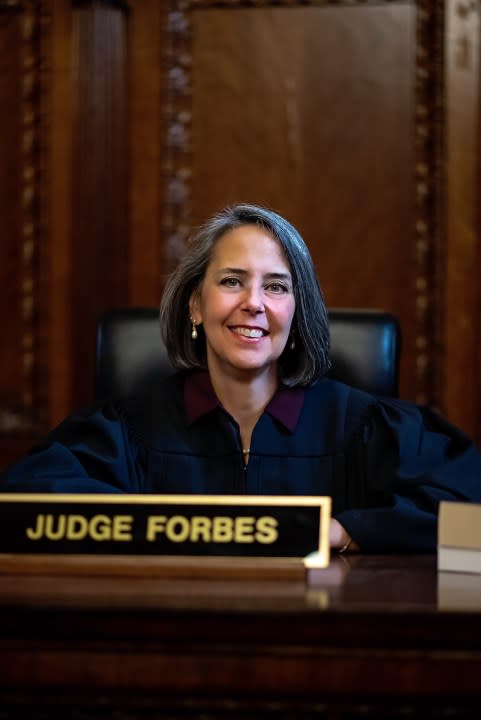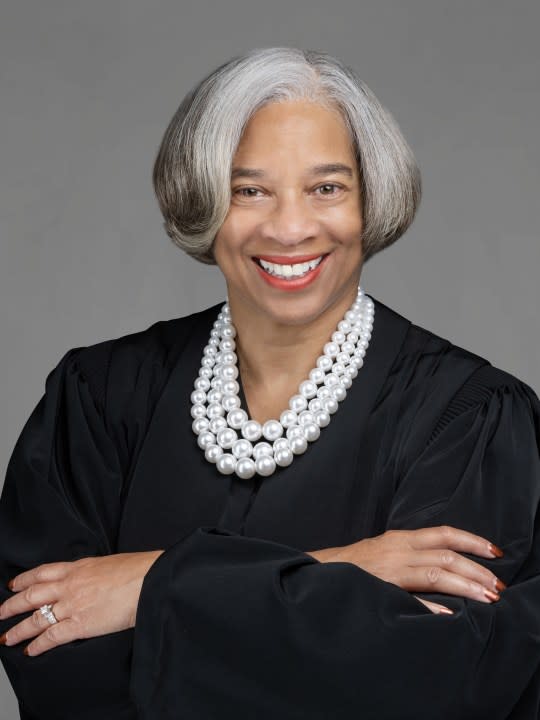Two Democrats face off for Ohio Supreme Court candidate nomination

COLUMBUS, Ohio (WCMH) – The partisan lean of the Ohio Supreme Court will be decided in November, but for one seat, Democratic voters must first decide who they’re nominating to run against a Republican candidate.
Judges Lisa Forbes and Terri Jamison are facing off in the Democratic primary election, vying for the chance to take one of three open seats on the state’s high court. Whoever wins on Tuesday will run against Republican nominee and Franklin County Judge Dan Hawkins for Justice Joe Deters’ seat.
Multiple dead after tornado warnings, strong storms in central Ohio
Deters, who was appointed by Gov. Mike DeWine to fill the seat left vacant by Sharon Kennedy’s election to chief justice in 2022, is not defending his own seat. Instead, he’s challenging Justice Melody Stewart, a Democrat, for her seat on the bench.
This is only the second election in which most judicial candidates, including candidates for the Supreme Court, are identified by party affiliation. If Jamison and Forbes had it their way, it would be the last.
Who is Lisa Forbes?
Forbes is in her first term on the Eighth District Court of Appeals, the appellate court for Cuyahoga County. Prior to her judgeship, the Case Western University law graduate spent nearly three decades, much of which as partner, at the Cleveland office of Vorys, Sater, Seymour and Pease, focusing on complex litigation.

At a candidate forum held by the Ohio Fair Courts Alliance and Ohio Families United for Political Action and Change in early March, Forbes said she was running to ensure that the Supreme Court is an “effective firewall to protect our democracy and the rule of law.” Referring to the abortion rights amendment that Ohio voters passed in November, she said she’s concerned about lawmakers attempting to sidestep – or ignore – voters’ clear decisions in elections.
“When people speak, it is the legislature’s job to do their will,” Forbes said.
Similarly, Forbes said it is justices’ job to interpret the laws the legislature writes, regardless of how they personally feel about the statutes. But the public doesn’t necessarily have that conception of the bench, she noted.
In fact, in Forbes’ eyes, the greatest obstacle to achieving justice is the lack of trust and confidence in the judiciary. The system cannot work if the people do not trust it, she said. Increasing transparency is vital, Forbes said. As an appellate judge, she said she aims to thoroughly explain her decisions to the parties.
Columbus among U.S. cities with highest rent increase over past year, report says
She also has a lengthy recusal list, she said, and hoped more judges and justices would do the same. Deters, for example, has faced scrutiny for not recusing himself from a case he argued while Hamilton County prosecutor.
Forbes also denounced the 2021 addition of partisan labels to Ohio Supreme Court and appellate judicial candidates, calling it a “crass attempt” to turn judges into legislators. She said the appearance of partisan labels inaccurately signals to potential parties before the court – and the public itself – that justices are beholden to political parties’ interests and will rule accordingly.
Forbes, who is board chair of The Centers – previously the Centers for Family and Children – in Cleveland and who volunteers with voter protection programs, said a major step the Supreme Court should take in ensuring access to justice is increasing the number of cases it hears.
The Supreme Court only hears about 5% of cases it receives every year. But many more cases could have significant impact on citizens’ lives, Forbes said.
“We should have a wide filter, not a narrow one,” Forbes said. “More like a colander, less like a sieve.”
Forbes was endorsed by the Ohio Democratic Party after a screening of both candidates and an executive committee vote. Search for Forbes’ opinions on the Ohio Supreme Court website by filtering for her name and the Eighth District Court of Appeals.
Who is Terri Jamison?
Jamison has, by her own account, taken a less conventional path to the bench. On the 10th District Court of Appeals – Franklin County’s – since 2020, Jamison originally hails from West Virginia, working in the coal mines and as a child welfare daycare evaluator.

When she moved to Ohio, she earned her undergraduate degree from Franklin University while working full time. After earning her law degree from Capital University, she started her legal career as a Franklin County public defender before opening her own private practice focused on criminal, juvenile and domestic relations cases.
In 2012, Jamison was elected to the Franklin County court’s juvenile and domestic relations branch. There, she worked on beefing up the court’s translation services for immigrants and other non-English speakers. She’s a member of the National Council of Juvenile and Family Court Judges and helped release a report on the disproportionate discipline that Black girls face in schools.
Ohio State to build $183 million Wexner Medical campus in Powell
Like Forbes, Jamison said she’s running to, in part, restore trust in and integrity of the high bench. She said she seeks to understand the people behind the cases that come before her alongside the narrow legal questions she’s often asked to answer.
Jamison said the biggest obstacles to achieving justice are the financial roadblocks that not only prevent parties from making their best arguments, but also prevent cases from even making it to attorneys’ desks. That’s particularly the case for criminal defendants who cannot afford attorneys for appeals.
To increase judicial transparency, Jamison said court systems should develop both criminal sentencing databases and civil case judgment databases. The lack of easily available data, she said, makes it more difficult to hold individual judges accountable.
“I’ve seen litigants treated differently by different judges, I’ve seen litigants treated differently in administrative hearings,” Jamison said.
Thousands lose power in central Ohio after tornado warnings
Jamison similarly criticized partisan labels for judicial races, having run for the Ohio Supreme Court against Justice Pat Fischer in the first race since their addition. Preconceived notions of how justices decide not only decrease public trust in court decisions, she said, but in some cases prevent parties from even attempting to make their arguments.
Jamison, like Forbes, is concerned about the quantity of cases the court hears, especially related to the rights of criminal defendants. The court accepts appeals based on what is of great public or general importance, but how justices determine what is important is based on their own backgrounds, beliefs and biases. That’s why having a bench diverse in experience and perspective is vital, she said.
“When you have a bench that is not diverse in culture, as well as education and training, you may not see a great public interest in case that someone may be able to educate you about,” Jamison said.
Jamison has been endorsed by the Working Families Party, the Ohio Women’s Alliance Action Fund, and Black Ohio Leaders for Democracy. Search for Jamison’s opinions on the Ohio Supreme Court website by filtering for her name and 10th District Court of Appeals
For the latest news, weather, sports, and streaming video, head to NBC4 WCMH-TV.

